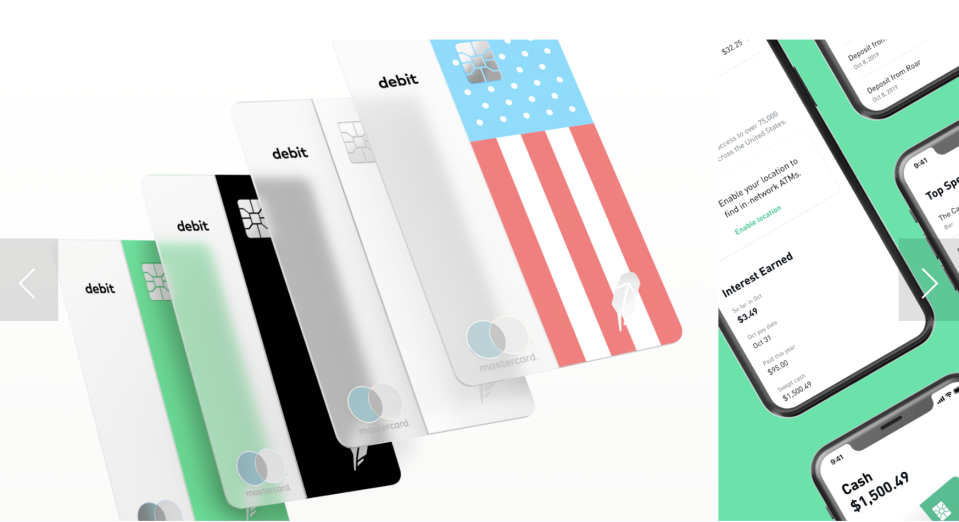Why Robinhood's latest salvo in the broker wars is good but 'not groundbreaking'
This week, Robinhood fired a new shot in the war for retail investors, by launching a feature that offers users a modest return on their deposits.
The stock trading app announced a new ‘Cash Management’ service that boasts a 2.05% Annual Percentage Yield (APY) on uninvested money in users’ brokerage accounts, which can be spent with a special debit card. That rate is 20 times higher than the national average of 0.1%, according to Bankrate.
With the app, once users deposit cash into their accounts and opt into the program, they’re eligible to earn interest on that money. Any balances in their account goes into an FDIC-insured partner banks — six of which are: Wells Fargo, HSBC, Goldman Sachs, Citibank, U.S. Bank and Bank of Baroda.
But the service hasn’t launched just yet. The waitlist opened on Tuesday in the U.S., with the first users to be admitted soon.
Bankrate chief financial analyst Greg McBride told Yahoo Finance that the initiative was good, but hardly “groundbreaking” given that investors can park their money directly with an FDIC-backed bank, instead of an intermediary.
But nevertheless, “the more competitive offerings out there on the market, that’s good for the consumer,” added McBride. “This is another example of how easy it is to increase your interest earnings twenty-fold, by moving your savings accounts to a more competitive offering.”

The interest rate-bearing account is a retooled approach to a previous initiative that crashed and burned almost immediately.
Last year, the platform tried and failed to launch a checking and savings account, but the proposal came under withering attack from regulators and industry watchers.
At the time, the company had said it would offer zero-fee checking and savings accounts with a 3% rate, but the announcement was quickly shot down by the Securities Investor Protection Corporation in particular. The SIPC was supposed to insure users’ funds, but said that they hadn’t even agreed to the terms that Robinhood announced, and declared them ineligible.
Robinhood, however, insisted its new approach would work this time around.
“We believe our financial system should work for you and do more for your money,” they wrote. “To help get us there, we announced plans in December to launch a new product. We made mistakes with that announcement, which led us to hit the reset button and start over from scratch.”
If any of the Robinhood-affiliated banks go bust, FDIC will step in and return customers for up to $250,000 per institution. Users can’t choose to opt out of specific banks.
Those who want to spend that money earning interest can use a special Mastercard debit card, which will be issued by Sutton Bank. There will be four card designs, green, black, white and the American flag.
The funds can be accessed at over 75,000 ATMs without foreign transaction or maintenance fees — and no account minimums, and can be used with Apple, Samsung or Google Pay. Robinhood will make money on this by taking a chunk of the interchange fees from the transactions made on its debit card, which will run in partnership with the six banks involved in this.

Learning from past mistakes
After the industry experienced a shake-up with big brokers like Charles Schwab and E*Trade, among others, dropped their trading commission fees to zero, the big question then was what Robinhood, one of the companies that had been offering zero-fee trading from the start, was going to do next.
Retail investing platforms are waging a battle to attract new, younger investors — but while making it cheaper for them to trade is seen as a boost, it’s hardly a cure-all, some say.
“Smaller investors and folks who trade frequently will see a meaningful benefit, but just because you can do something for free, doesn't mean you should,” said Josh Rowe-Heupler, general manager of investments at Lendingtree/Magnify Money.
“Folks should take care to research and consider investing decisions rationally and in full view of their personal financial situation,” he added.
—
Aarthi is a writer for Yahoo Finance. Follow her on Twitter @aarthiswami.
Read more:
Charles Schwab and brokers cut fees as some warn 'there is no real free lunch'
'The power of this is massive': Student debt help could be on the way with new bill
Forever 21 bankruptcy shows retailer 'paying a big price' for mistakes
Follow Yahoo Finance on Twitter, Facebook, Instagram, Flipboard, LinkedIn, YouTube, and reddit.


